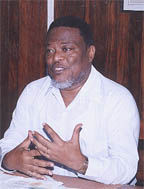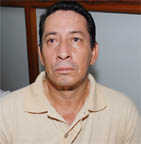Problems in Amerindian communities being ignored – groups

Amerindian groups present were concerned that not enough attention is being placed on problems posed to indigenous communities by miners and that the PM’s address was an example of this.
Delivering the opening address at the May 19-20 Guianas Gold Mining Workshop organized by the World Wildlife Fund (WWF) the Prime Minister said that the sheer increase in the number of miners and the capacity of mining operations to despoil the environment impose upon miners the responsibility to mitigate the environmental impact of mining.

Meanwhile, representatives of Amerindian organizations attending the WWF forum told Stabroek Business that they were disappointed that neither the Prime Minister’s address nor the subsequent report on the mining sector presented to the workshop by the Guyana Geology and Mines Commission (GGMC) addressed the issue of the impact of mining on Amerindian communities. “It is disappointing, to say the least, that at a forum which seeks to examine the challenges facing the mining sector in the Guianas the keynote address made no direct reference to the many and varied problems being encountered by the Amerindian host communities,” Amerindian Action Movement of Guyana (TAMOG) President Peter Persaud told Stabroek Business.

But attorney-at-law and Amerindian People’s Association (APA) representative David James told Stabroek Business that earnings from the sector was only one aspect of the bigger mining picture. He echoed the sentiments expressed by Persaud over the absence from the Prime Minister’s address of any direct reference to the need for the mining community to treat with the impact of mining on Amerindian communities as a critical issue for the sector.
“Whenever you talk about gold mining in Guyana the people who are directly affected are Amerindians and clearly the Prime Minister’s address did not deal adequately with Amerindian issues,” James told Stabroek Business.
According to the Prime Minister, Guyana was moving inevitably in the direction of a greater formalizing of the mining sector based on the presumption of surface rights holders and all those who are affected will be compensated and will not suffer from the pursuit of mining. “We have to start these days from the assumption that there are surface rights holders who are being impacted,” the Prime Minister added.
However, James told Stabroek Business that in his experience those host communities that are closest to mining operations in Guyana generally benefit the least from the returns from the industry. “One of the things that I have noticed from my own visits to the interior is that communities that are close to the gold mining areas are usually the poorest,” James said.
The Prime Minister told the forum that if mining is to be pursued there must be an economic evaluation of the results of pursuing that mining.
“For me therefore, an important step for us at this time is to develop low-impact prospecting methods for small and medium scale mining so that an evaluation could be done before hand as to whether it would be economic to pursue that mining.”
And according to the Prime Minister the current increased earnings from mining imposed on miners a responsibility to invest both in improving the quality of mining camps and rendering mining operations cheaper and more efficient. He called for the development of techniques for the “restoration of areas after they are mined.”
This week’s Guianas mining forum was convened to review improved techniques and practices for better management of the gold-mining sector for the reduction of environmental and human health impacts, to create a network of technological improvement and awareness among stakeholders and to learn from the experiences of other countries with similar sectors.
Presentations to the forum from representatives of the mining sector in French Guiana and Suriname addressed some of the common problems facing the mining sector in the Guianas including the need to strengthen legislative mechanisms and resources for enforcement of responsible mining practices.
In his address the Prime Minister said that the mining sector needs to pay attention to being “cordial partners’ with other stakeholders in the forests including timber operators, handicraft producers, tourism operators as well as the nearby villages.





